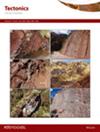Architecture and Evolution of the Southern Chotts-Jeffara Basin, Tunisia
IF 3.6
1区 地球科学
Q1 GEOCHEMISTRY & GEOPHYSICS
引用次数: 0
Abstract
Southern Tunisia is known to be less deformed and simpler than its neighboring Atlassic domain to the north. This area is complex and basin evolution in the Southern Chotts-Jeffara (SCJ) basin is debated. In this paper we combined surface and subsurface data with low temperature thermochronology (LTT) to reinvestigate the tectono-sedimentary evolution of the SCJ basin from Permian to Jurassic. We reconstruct the present-day architecture of the SCJ basin along two regional sections. In these sections, we focused mainly on regional thickness variations and on internal reflections interpreted from seismic data. We observe three structural elements: (a) A Paleozoic culmination, oriented E-W, capped by Mid-Upper Triassic deposits; (b) the Tebaga of Medenine (ToM), a culmination also oriented E-W but located ∼50 km north of the Paleozoic culmination; and (c) A Triassic culmination in the eastern part of the area, oriented NW-SE. We note the absence of major normal faults along the sections. The LTT data we present are the first published in this area and allow to reconstruct the timing and magnitude of vertical movements. These data prove: (a) exhumation at ∼230 Ma of the Permian and Lower Triassic units associated with the onset of the ToM removing locally about 900 m of pre-Cretaceous sediments; and (b) the development of the Triassic culmination ∼180 Ma removing 2000 m of pre-Cretaceous sediments in the Jebel Rehach. This study demonstrates that vertical movements in the SCJ basin are controlled by long-wavelength processes developed essentially in shortening regimes.突尼斯南乔特斯-杰法拉盆地的结构与演变
众所周知,突尼斯南部与北部相邻的阿特拉斯大陆相比,变形程度较轻,地层较为简单。该地区地形复杂,南乔特斯-杰法拉(SCJ)盆地的盆地演化备受争议。在本文中,我们将地表和地下数据与低温热震学(LTT)相结合,重新研究了南乔兹-杰法拉盆地从二叠纪到侏罗纪的构造沉积演化过程。我们沿两个区域剖面重建了 SCJ 盆地的现今构造。在这些断面上,我们主要关注区域厚度变化和地震数据解释的内部反射。我们观察到三个结构要素(a) 古生代顶点,呈东西走向,被中-上三叠统沉积覆盖;(b) 梅德宁特巴加(Tobaga of Medenine,ToM)顶点,也呈东西走向,但位于古生代顶点以北 50 公里处;(c) 该地区东部的三叠统顶点,呈西北-东南走向。我们注意到这些断面上没有大的正断层。我们提供的 LTT 数据是该地区首次公布的数据,可以重建垂直运动的时间和幅度。这些数据证明:(a) 二叠纪和下三叠纪单元在 ∼ 230 Ma 发生掘起,与 ToM 的开始有关,在局部地区移走了约 900 米的白垩纪前沉积物;(b) 三叠纪顶点的发展 ∼ 180 Ma,在 Jebel Rehach 移走了 2000 米的白垩纪前沉积物。这项研究表明,SCJ 盆地的垂直运动主要是由在缩短机制中形成的长波长过程控制的。
本文章由计算机程序翻译,如有差异,请以英文原文为准。
求助全文
约1分钟内获得全文
求助全文
来源期刊

Tectonics
地学-地球化学与地球物理
CiteScore
7.70
自引率
9.50%
发文量
151
审稿时长
3 months
期刊介绍:
Tectonics (TECT) presents original scientific contributions that describe and explain the evolution, structure, and deformation of Earth¹s lithosphere. Contributions are welcome from any relevant area of research, including field, laboratory, petrological, geochemical, geochronological, geophysical, remote-sensing, and modeling studies. Multidisciplinary studies are particularly encouraged. Tectonics welcomes studies across the range of geologic time.
 求助内容:
求助内容: 应助结果提醒方式:
应助结果提醒方式:


